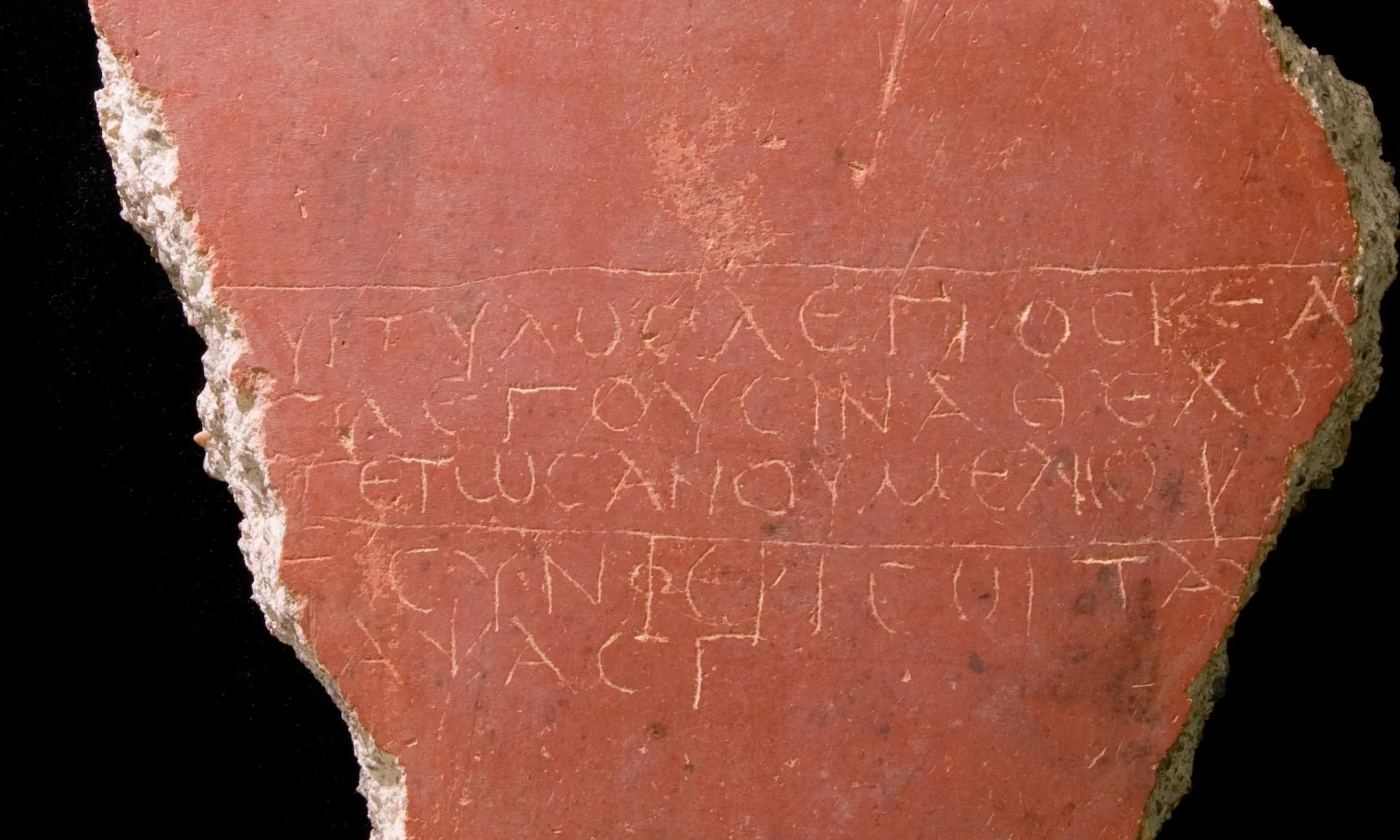‘I don’t care’: text shows modern poetry began much earlier than believed
Academic finds that lines widely reproduced in the eastern Roman empire are ‘stressed’ in a way that laid the foundations for what we recognise as poetry
The poem written in a graffito from Cartagena, Spain in the second to third century. Photograph: José Miguel Noguera Celdrán
For Taylor Swift, the “haters gonna hate”, but she’ll just “shake it off”. Now research by a Cambridge academic into a little-known ancient Greek text bearing much the same sentiment – “They say / What they like / Let them say it / I don’t care” – is set to cast a new light on the history of poetry and song.
The anonymous text, which concludes with the lines “Go on, love me / It does you good”, was popular across the eastern Roman empire in the second century, and has been found inscribed on 20 gemstones and as a graffito in Cartagena, Spain.
After comparing all known versions of the text for the first time, classics professor Tim Whitmarsh spotted that it used a different form of metre than usually found in ancient Greek poetry, employing stressed and unstressed syllables. Whitmarsh said that “stressed poetry”, the ancestor of all modern poetry and song, was unknown before the fifth century, when it began to be used in Byzantine Christian hymns. Before the emergence of stressed poetry, poetry was quantitative – based on syllable length.
“We’ve known for a long time that there was popular poetry in ancient Greek, but a lot of what survives takes a similar form to traditional high poetics. This poem, on the other hand, points to a distinct and thriving culture, primarily oral, which fortunately for us in this case also found its way on to a number of gemstones,” said Whitmarsh.
“You didn’t need specialist poets to create this kind of musicalised language, and the diction is very simple, so this was clearly a democratising form of literature. We’re getting an exciting glimpse of a form of oral pop culture that lay under the surface of classical culture.”
Whitmarsh believes the verse, with its lines of four syllables, with a strong accent on the first and a weaker on the third, could represent a “missing link” between the lost world of ancient Mediterranean oral poetry and song, and the more modern forms that we know today. It is, he says, so far unparalleled in the classical world.
“Poetry was so important; everyone read Homer and all that sort of thing. But we know that spoken language wasn’t really appropriate to that kind of poetry, so at some point people come in with stressed poetry, which is the equivalent of modern poetry. That’s the form we use all the time, and it’s so natural to us now that it feels as if it’s universal, but it’s not – it actually occurred in Greek culture at a specific moment. This poem pushes back the earliest appearance of stressed poetry by at least 300 years,” he said. “It has this sort of magnetic rhythm to it, four beats to the bar, a stress on the first beat, and weaker stress on the third beat, which is rock’n’roll and pop music as well.”
The theme of the poem “also feels preternaturally modern”, said Whitmarsh, comparing it to the Sex Pistols line: “We’re pretty a-pretty vacant / And we don’t care.” The poem reads: “Λέγουσιν They say / ἃ θέλουσιν What they like / λεγέτωσαν Let them say it / οὐ μέλι μοι I don’t care / σὺ φίλι με Go on, love me / συνφέρι σοι It does you good.”
“It’s the idea of not caring – this strident assertion of your individuality in a world that’s demanding things of you,” Whitmarsh said.
The gemstones on which the poems were inscribed, the best preserved of which was found around the neck of a young woman buried in a sarcophagus in what is now Hungary, were mass-produced by workshops and distributed from Spain to Mesopotamia. Whitmash, whose paper on the text has just been published in the Cambridge Classical Journal, believes they were mostly bought by people from the middle ranks of Roman society.
“The closest modern equivalent is probably a quote T-shirt. When you have people across a huge empire eager to buy into things that connect them to centres of fashion and power, you have the conditions for a simple poem to go viral, and that’s clearly what happened here,” he said. “I think the poem appealed because it allowed people to escape local pigeon-holing, and claim participation in a network of sophisticates who ‘got’ this kind of playful, sexually charged discourse.”
Whitmarsh came across the poem in a collection of inscriptions, digging into its history after a Cambridge colleague, Anna Lefteratou, a native Greek speaker, said it reminded her of some later medieval poetry.
“That prompted me to dig under the surface and once I did that these links to Byzantine poetry became increasingly clear. It was a lockdown project really. I wasn’t doing the normal thing of flitting around having a million ideas in my head. I was stuck at home with a limited number of books and rereading obsessively until I realised this was something really special,” he said. “The reason no one has thought about it as a poem before is because it’s not catalogued alongside works of literature, it’s catalogued as an inscription. We’ve got tens of thousands of inscriptions from antiquity, and I just think people weren’t looking for it.”










